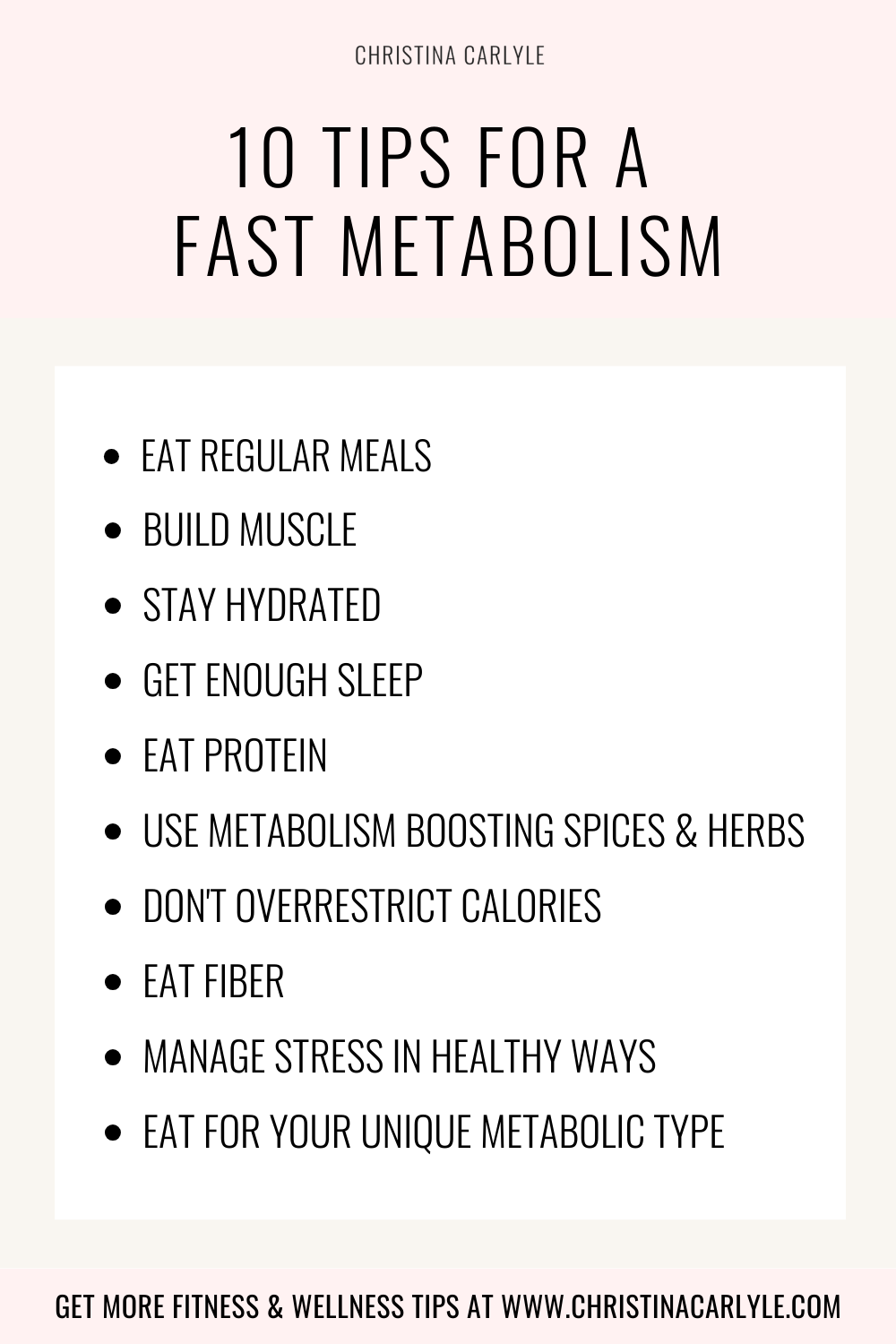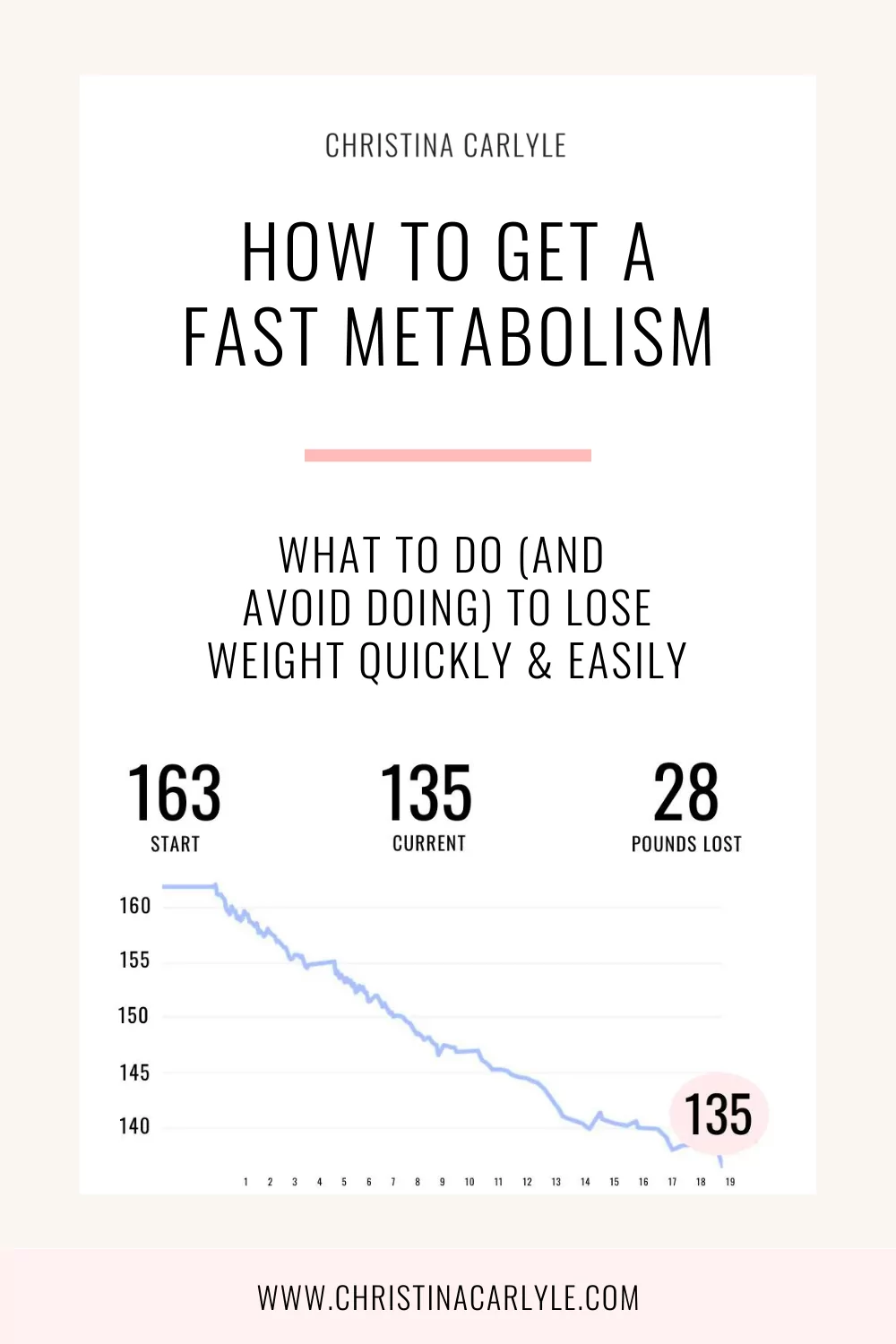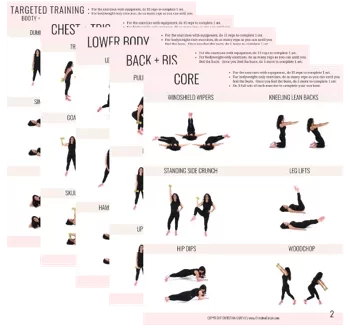Last Updated on November 9, 2023
Just about everyone I talk to who struggles with their weight assumes they have a slow metabolism and that a fast metabolism will help them reach their weight loss goals… and they’re on the right track!
So today I’ll be digging into tips for a fast metabolism. I’ll be covering:
- What the metabolism really is and what it does (HINT: It’s not just to make you gain/lose weight)
- How to make Metabolism Fast (the science)
- Tips for a Fast Metabolism
- Things that Slow Metabolism Most
By the time you’re done, you’ll have a better idea of what to do (and avoid doing) to keep your metabolism fast and functioning properly so you can get fit and healthy.
What is Metabolism?
Metabolism is the set of chemical processes that occur in your body to maintain life… aka to keep you alive. It encompasses every chemical reaction happening in your cells, systems, organs, etc. Some of the main metabolic functions include the conversion of the food you eat into energy, the building and repair of tissues, and the elimination of waste products… but there are literally thousands of other metabolic processes that are essential for various bodily functions, including respiration, digestion, circulation, and cell growth. Because hormones are chemicals, every single hormone you have has a direct impact on metabolism and metabolic health.
Fat loss isn’t a vanity/appearance mechanism – it’s is a survival instinct. You burn fat when the body isn’t getting enough energy. You gain weight when you consume excess energy as a survival mechanism in case you’ll be without energy/food in the future.
Metabolism can be broken down into four key components or layers. In terms of gaining/losing weight you can only maniupulate 2 of the 4. The 4 layers of metabolism are:
- Basal Metabolic Rate (BMR): BMR represents the energy your body expends at rest to maintain essential functions like breathing, circulating blood, and maintaining body temperature. It accounts for the largest portion of your daily energy expenditure (typically around 60-75%). BMR is influenced by factors such as age, gender, genetics, and muscle mass. You have limited control over your BMR, as it’s primarily determined by your genetics and age. If you’re trying to lose weight NEVER EAT LESS THAN YOUR BMR!!!!! Use my BMR Calculator to find out what BMR calorie requirements are. Once you know NEVER eat less than that amount.
- Physical Activity: Physical activity includes all the energy your body uses during exercise and daily movement, such as walking, working out, or even fidgeting. It’s the most variable and controllable layer of metabolism. You can increase your physical activity to burn more calories, which can contribute to fat loss.
- Thermic Effect of Food (TEF): TEF represents the energy your body expends to digest, absorb, and metabolize the food you eat. Different macronutrients have different TEF values, with protein having the highest, followed by carbohydrates and fats. By choosing foods that require more energy to digest (like protein-rich foods), you can increase the TEF slightly.
- Non-Exercise Activity Thermogenesis (NEAT): NEAT includes the energy your body uses for all daily activities that aren’t structured exercise, such as standing, walking, typing, or gardening. NEAT can vary greatly between individuals and is influenced by factors like lifestyle and occupation. You can increase NEAT by incorporating more movement into your daily routine, like taking the stairs instead of the elevator or walking more.
How to make Metabolism Fast?
When it comes to burning fat and losing weight, the only layers of the metabolism that you can directly manipulate are physical activity and, to a certain extent, the thermic effect of food:
- Physical Activity: Increasing your level of physical activity, both structured exercise and non-exercise activities, can lead to a calorie deficit. When you consistently burn more calories than you consume, your body starts using stored fat for energy, leading to fat loss.
- Thermic Effect of Food (TEF): While you can’t drastically manipulate TEF, choosing foods that are more protein-rich can slightly increase the energy expenditure associated with digestion. This means that incorporating a higher proportion of protein in your diet may help you burn more calories during the digestion process.
It’s important to note that while these layers are within your control to some extent, a holistic approach to weight loss and fat burning is most effective. A combination of balanced nutrition, regular physical activity, and lifestyle changes will yield the best results for sustainable and healthy fat loss.
Why? Because the metabolism involves every single chemical reaction in your body. For a fast metabolism, you need every single reaction to function properly.
To function properly, your body needs specific nutrients and to be in homeostasis. Anything that knocks you out of homeostasis – or balance – can affect metabolic functions and slow metabolism… when this happens it becomes easier to gain weight.
My Workout and Meal Plan Programs increase metabolism by giving your body all the support it needs to function in a balanced way so you’ll always be in homeostasis. When in balance + exercising + eating the right nutrients you can burn fat 3 times faster!
It’s VERY important to take a holistic approach because if not, you can affect your body’s ability to get the benefits from food & exercise.
You can eat perfectly and exercise like a pro but if you’re not acting in a way that keeps your hormones, digestion, detox pathways, immunity, and nervous system balanced – you’ll experience imbalances that can slow metabolism. That’s also why all of my Holistic Weight Loss & Wellness Programs work so well and how I get rapid results.
I’m going to give you tips to boost metabolism in a holistic way… then I’ll share things to avoid doing that can slow metabolism, too.
10 Tips for a Fast Metabolism
- Eat Regular Meals: When you eat regular meals and snacks, you provide your body with a steady source of energy. This helps prevent your metabolism from slowing down to conserve energy, which can happen when you skip meals. As a general rule, aim for three balanced meals and one or two snacks throughout the day. Please note the amount of calories and nutrients you need (and the number of meals) is dependent upon your current weight, goal weight, and metabolic type. Different people require different amounts of nutrients and energy that’s BEST for them. To make your metabolism fast I STRONGLY recommend eating for your unique metabolic type & goals. Take my Metabolic Type Quiz & Training to learn your type.
- Build Muscle: Muscle tissue is more metabolically active or ‘calorically expensive’ than fat tissue. Meaning that even at rest, your body burns more calories maintaining muscle compared to fat. So the general rule is more muscle = more calorie burn/a faster metabolism. Incorporating strength training exercises, like weightlifting or bodyweight exercises, can help you build and maintain muscle mass, which, in turn, boosts your metabolism. There are specific amounts of TRUE exercise you need to build muscle and boost metabolism. Remember, NEAT (non-exercise associated thermogenesis) aka non exercise movement does NOT increase metabolism. Random weight training workouts won’t do much in terms of results. Doing the same thing over and over again won’t either. That’s why I STRONGLY recommend doing a complete plan, like my Workout Programs so you’re doing just enough – but not too much – weight training to burn fat and stay balanced – and can avoid putting a huge strain or causing imbalances in your metabolism. YOU CAN WEIGHT TRAINING TOO MUCH/HARD and throw your body off balance that’ll slow metabolism even though you’re building muscle… training improperly will make you feel terrible!!
- Stay Hydrated: Dehydration can slow down metabolic processes, as many chemical reactions in your body require water. Drinking enough water helps your body efficiently metabolize food and transport nutrients to cells. As a general guideline, aim to drink at least 8 glasses (64 ounces) of water per day, more if you’re active or in hot weather. To find out how much water you really need use my Water Intake Calculator. You’ll be shocked by how much you really need!
- Get Enough Sleep: Sleep is crucial for maintaining a healthy metabolism. When you don’t get enough sleep, your body’s hormonal balance is disrupted, leading to increased hunger and decreased energy expenditure. Aim for 7-9 hours of quality sleep each night to support your metabolism. Use these tips for better sleep. They work wonders!
- Eat Protein: Protein has a high thermic effect, meaning it requires more energy for digestion and metabolism compared to carbohydrates and fats. Including sources of lean protein in your diet, such as chicken, fish, lean meats, tofu, and legumes, can temporarily boost your metabolic rate. Everyone needs a different amount of protein. Use my Protein Intake Calculator to find out how much you need.
- Spice It Up: Certain spices, like chili peppers, contain a compound called capsaicin, which can increase your metabolic rate temporarily. It does so by increasing thermogenesis, the process by which your body produces heat and burns calories. Incorporating these spices into your meals can give your metabolism a slight boost. FYI All of my Meal Plan & Nutrition Programs include the best spices and herbs for a fast metabolism.
- Don’t Overrestrict Calories: Severely restricting your calorie intake can cause your body to go into “starvation mode.” When this happens, your metabolism slows down to conserve energy, making it harder to lose weight. It’s better to aim for a moderate and sustainable calorie deficit for gradual and healthy weight loss. FYI All of my Meal Plan & Nutrition Programs include masterclass videos that explain exactly how many calories you need and how to taper them gradually as you get closer to your goal… all without feeling deprived, hungry, or restricted.
- Eat Fiber: Foods rich in fiber, like fruits, vegetables, and whole grains, can help regulate blood sugar levels and keep you feeling full. This can help with weight management by preventing overeating and supporting your metabolism. Fiber also aids in digestion and nutrient absorption. FYI All of my Meal Plan & Nutrition Programs include the best sources of dietary fiber for a fast metabolism… they force metabolism to increase every time you eat them. If your ‘fiber’ is processed and comes from a supplement it’s NOT beneficial.
- Manage Stress: Chronic stress can lead to hormonal imbalances that affect your metabolism. Stress can trigger the release of cortisol, a hormone that can increase appetite and promote fat storage. Engage in stress-reduction techniques like meditation, deep breathing, yoga, or mindfulness to help manage stress and support a healthier metabolism.
- Eat for Your Unique Metabolic Type: An individual’s metabolism is unique and can be influenced by various factors, including genetics, lifestyle, and dietary preferences. By tailoring your diet to match your metabolic type and needs, the idea is that you can optimize your metabolism and potentially keep it running at an efficient and fast rate and stay in balance. For example, someone with a parasympathic metabolic type needs different amounts/types of foods/drink compared to a sympathetic type. And as I mentioned before different people require different amounts of nutrients and energy that are BEST for them and their unique metabolic types & needs. To make your metabolism fast I STRONGLY recommend eating for your unique metabolic type & goals. Take my Metabolic Type Quiz & Training to learn your type.
Now that you know what to do, here’s what to avoid doing so everything listed above can work as intended. Remember, you can’t make your metabolism fast when you simultaneously do things that slow it down/piss it off.
THINGS TO AVOID TO KEEP YOUR METABOLISM FAST
Several factors can slow down your metabolism. It’s important to be aware of these factors, as they can impact your overall health and make it more challenging to maintain a healthy weight.
Here are the main factors that can slow metabolism:
- Age: Metabolism naturally slows with age. This is because as you get older, you tend to lose muscle mass, and your body’s metabolic rate decreases. However, you can counteract this to some extent by staying active and engaging in strength training exercises, and eating for your unique metabolic needs. A lot of people assume weight gain is a normal part of aging – it’s NOT. Weight gain that occurs in conjunction with aging is a direct result of engaging in lifestyle choices that disrupt normal metabolic life-sustaining functions. The 3 most common reasons are muscle mass loss (from lack of exercise), nutrient deficiency/imbalances (from not eating for your unique metabolic type/needs), and by making the body imbalanced (hormones, stress, digestion, detoxification, etc.)
- Muscle Loss: As mentioned, muscle tissue is more metabolically active than fat tissue. If you lose muscle mass due to inactivity or aging, your metabolism will slow down. Regular strength training can help preserve and build muscle.
- Dieting and Calorie Restriction: Drastically reducing your calorie intake for an extended period can signal to your body that it needs to conserve energy. This can lead to a slower metabolism, making it harder to lose weight in the long run. It’s important to focus on sustainable, moderate calorie deficits for weight loss. I can’t begin to tell you how many women come to me struggling to lose weight who are severely undereating their calories and overexercising. It’s literally the WORST thing you can do to your metabolism.
- Chronic Stress: Chronic stress can lead to an increase in the hormone cortisol, which can affect metabolism. Elevated cortisol levels can lead to increased appetite, fat storage, and muscle breakdown.
- Lack of Sleep: Inadequate sleep can disrupt hormonal balance, leading to metabolic changes that promote weight gain and slower energy expenditure.
- Hormonal Changes: Hormonal imbalances, such as thyroid disorders, can significantly affect metabolism. An underactive thyroid (hypothyroidism) can slow metabolism, leading to weight gain and fatigue. Hormone issues that affect weight are typically the direct result of lifestyle habits, like too much stress, poor detoxification, gut health issues, etc.
- Lack of Physical Activity: A sedentary lifestyle can lead to a decrease in muscle mass and overall physical fitness, both of which can slow down your metabolism. Regular physical activity is essential for maintaining a healthy metabolic rate. Not exercising is the new cigarette. Exercise decreases all life-threatening diseases by 50%. Disease affects survival, metabolism is in place for your survival. Disease = slow metabolism.
- Extreme Dieting and Fasting: Extreme diets and extended fasting periods can slow metabolism as your body goes into energy conservation mode to adapt to the reduced calorie intake. This can make it more challenging to lose weight. I see this a lot in clients who fast improperly or crash diet. It’s extremely damaging to metabolism and sets you up for rapid regain.
- Nutrient Deficiencies: Inadequate intake of essential nutrients, such as vitamins and minerals, can lead to metabolic disruptions. It’s crucial to maintain a balanced diet that provides all the necessary nutrients… otherwise, you’ll experience metabolic dysfunction which slows metabolism and can cause (eventually) disease.
- Medications and Medical Conditions: Some medications and medical conditions can affect metabolism. For example, certain medications may lead to weight gain, and conditions like polycystic ovary syndrome (PCOS) can impact metabolism. That’s because metabolism that’s imbalanced from not getting its needs met can’t function properly. When metabolism starts to dysfunction over time it’ll result in a diagnosis or disease. Left untreated metabolic diseases can result in death.
There are specific symptoms of metabolic dysfunction. If you have them that means your metabolism is slow. I have a free training that includes a Free Metabolic Assessment to see how slow/fast aka dysfunctional/functional your metabolism is.
Note this training is to assess if your metabolism is functioning properly which is different from your metabolic type. First, you should make sure your metabolism is functioning properly, then you can make it even faster by eating for your unique metabolic type’s needs.
I hope this helped you understand what it takes to have a fast metabolism.
What do you need to work on most?
Let me know in the comments so I can point you in the right direction.
xo
Your Coach & Biggest Cheerleader,
![]()
Pin this post to Pinterest so you’ll have it forever.







